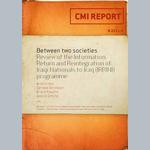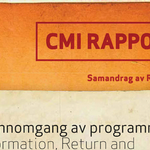Voluntary return to Iraq is a last resort
Iraqis represent the largest group of asylum seekers in Norway the last ten years. In 2008, the Norwegian Directorate of Immigration established the Information, Return, and Reintegration of Iraqi Nationals to Iraq (IRRINI). 1470 Iraqis have until now participated in the programme.
The IRRINI-programme provides returnees with information about the situation in their home area, return preparation, travel assistance, as well as cash support, career advice and reintegration support and follow-up upon arrival in Iraq.
An evaluation of IRRINI conducted by Chr. Michelsen Institute (CMI), the Peace Research Institute Oslo (PRIO), the University of Duhok and the Iraqi Research Foundation for Analysis and Development, found that most of the Iraqis who join the programme do not see the programme as voluntary. Their understanding is better captured by the term “mandatory return”, as suggested by the European Council on Returnees and Exiles. The primary motivation for participating in the programme was the denial of a Norwegian legal status. Only 2 % cited the benefits of IRRINI as the motivation for joining in the programme, though information about the programme strongly influenced their decision to return.
A different Iraq
The majority of the Iraqis reported that they felt well informed about the conditions in Iraq before they returned. Yet, 75 % of the interviewees in Iraq found the situation to be very different from what they had expected. The situation in Iraqi Kurdistan had improved and was better than expected, and a clear majority planned to remain where they had returned. In contrast, amongst the returnees to Baghdad, 56 % said the situation had deteriorated, whereas only 8 % found improvements. As a consequence, nearly half of the returnees to Baghdad did not know if they would or could stay. This, together with a lack of comparable data on reintegration outcomes makes it hard to assess the sustainability of the reintegration.
The importance of cash
The majority of the returnees are satisfied with the return travel and the cash assistance they received upon arrival in Iraq. Some of them used the cash assistance to start a small business, others to invest in homes or pay back loans. Even the modest amount provided was considered critical to a dignified return.
The programme is positively assessed by the returnees, but there is room for improvement. The reintegration support was problematic, not least because it involved rigid and opaque bureaucratic requirements that reduced returnee’s trust in the programme. The evaluation recommends replacing the reintegration package with a cash grant equaling the value of today’s package, 25 000 NOK. Such a model is more flexible, reduces administrative costs and time, and supports the returnees’ own capacities to plan and build a future for themselves.
A cash grant model must, however, be supplemented by a stronger emphasis on advice and planning before the return, and a more thorough follow-up in Iraq.
The evaluation is quite critical of the reintegration component where the implementer, the International Organization of Migration (IOM), is recommended to reduce bureaucracy, and provide their staff with more training on how to interact with returnees.
Publications

Between two societies: Review of the information, return and reintegration of Iraqi nationals to Iraq (IRRINI) programme
